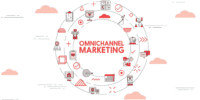Why Is Email Segmentation Important For Personalized Marketing?
Email segmentation is a crucial strategy in personalized marketing that aims to divide an email list into distinct segments based on various criteria. This technique allows marketers to tailor their messages and offers to specific groups of recipients, increasing the relevance and personalization of their campaigns.
By understanding their target audience and delivering content that resonates with their interests and needs, marketers can improve engagement and conversion rates, as well as enhance customer satisfaction and loyalty.
Furthermore, email segmentation helps optimize email deliverability and open rates, ensuring that messages reach the intended recipients and are more likely to be acted upon. By measuring and analyzing campaign performance, marketers can also gain valuable insights into the effectiveness of their strategies and make data-driven decisions to drive customer retention and repeat purchases.
Additionally, email segmentation can help reduce unsubscribes and complaints, while keeping businesses ahead of the competition in today’s highly competitive digital landscape.
Understand Your Target Audience
Understanding the target audience is crucial for effective email segmentation in personalized marketing. By segmenting email lists based on various demographics, interests, and behaviors, marketers can tailor their messages to specific groups, increasing the relevance and resonance of their communications.
This approach allows marketers to send targeted content that addresses the specific needs and preferences of each segment, resulting in higher open and click-through rates, improved customer engagement, and ultimately, increased conversion rates.
Moreover, by understanding the target audience, marketers can identify key segments that may require different marketing strategies and develop personalized campaigns accordingly. This not only enhances the overall customer experience but also helps build stronger relationships with customers, as they receive more relevant and meaningful communications that cater to their individual needs.
Increase Relevance and Personalization
Enhancing the relevance and customization of communication allows for a more targeted approach in order to cater to the specific needs and preferences of individual customers. Email segmentation plays a crucial role in achieving this level of personalization in marketing efforts.
By dividing the target audience into distinct segments based on various criteria, marketers can tailor their messages to each segment’s unique characteristics. This not only increases the likelihood of resonating with the recipients but also enhances their overall experience.
The importance of email segmentation for personalized marketing can be further understood through the following points:
-
Improved engagement: Segmented emails are more likely to capture the attention of recipients and encourage them to take the desired action.
-
Higher conversion rates: By delivering relevant content, personalized emails can drive recipients to convert at a higher rate.
-
Enhanced customer satisfaction: Personalized emails demonstrate that the brand understands and values the individual customer, leading to increased satisfaction and loyalty.
-
Efficient resource allocation: Targeted emails help marketers allocate their resources more effectively by focusing on the segments that are most likely to respond positively to their messages.
Improve Engagement and Conversion Rates
To optimize engagement and increase conversion rates, tailoring content based on distinct audience segments allows for a more targeted and compelling approach, captivating recipients and motivating them to take desired actions. By understanding the specific needs, preferences, and interests of different segments, marketers can deliver highly relevant and personalized email campaigns. This level of customization creates a sense of exclusivity and relevance, making recipients more likely to engage with the content and ultimately convert. When emails are personalized to meet the unique requirements of each segment, recipients feel understood and valued, leading to a stronger emotional connection with the brand. This emotional connection translates into higher engagement rates, as well as increased click-through and conversion rates. The table below highlights the benefits of email segmentation for improving engagement and conversion rates.
| Benefits of Email Segmentation |
|---|
| Higher engagement rates |
| Increased click-through rates |
| Improved conversion rates |
Enhance Customer Satisfaction and Loyalty
Customer satisfaction and loyalty can be strengthened by tailoring content to meet the specific needs and preferences of different audience segments, creating a personalized and relevant experience that fosters a stronger emotional connection with the brand.
Personalized email segmentation allows marketers to deliver targeted messages that resonate with individual customers, leading to enhanced satisfaction and loyalty. By segmenting the email list based on various factors such as demographics, purchase history, and browsing behavior, marketers can send personalized offers, product recommendations, and relevant content to each segment.
This approach not only increases customer satisfaction by providing them with information that is specifically relevant to their interests, but it also enhances their loyalty towards the brand. When customers feel understood and valued, they are more likely to engage with the brand and make repeat purchases, resulting in long-term loyalty and increased customer lifetime value.
- Customers feel valued and understood when they receive personalized emails.
- Personalized offers and recommendations increase customer satisfaction.
- Tailored content creates a sense of exclusivity and enhances brand loyalty.
Optimize Email Deliverability and Open Rates
Maximizing the efficiency of email delivery and increasing open rates is crucial for businesses aiming to optimize their communication strategies.
Email deliverability refers to the ability of an email to reach the intended recipient’s inbox without being filtered out as spam.
By segmenting email lists, businesses can tailor their messages to specific groups of recipients, increasing the relevance and likelihood of engagement. Segmentation allows marketers to send targeted emails based on various factors such as demographics, purchase history, or engagement level.
This personalized approach not only enhances the chances of desired actions such as opens and clicks but also reduces the risk of unsubscribes or spam complaints.
Additionally, optimizing email deliverability and open rates can lead to improved sender reputation, ensuring that future emails have a higher chance of reaching the recipients’ inboxes.
Overall, email segmentation plays a vital role in optimizing marketing efforts and achieving desired outcomes.
Measure and Analyze Campaign Performance
Analyzing and measuring campaign performance is essential for businesses seeking to evaluate the effectiveness of their marketing strategies. By measuring the performance of email campaigns, businesses can gain valuable insights into the success of their personalized marketing efforts. This data allows them to understand which campaigns are resonating with their target audience and which ones are underperforming.
Additionally, analyzing campaign performance helps businesses identify areas for improvement and make data-driven decisions to optimize future campaigns.
One important metric to consider when measuring campaign performance is the click-through rate (CTR). This metric indicates the percentage of recipients who clicked on a link within the email. A high CTR suggests that the email content is engaging and compelling, while a low CTR may indicate that the content needs improvement.
Other metrics to assess campaign performance include open rates, conversion rates, and unsubscribe rates. By analyzing these metrics, businesses can make informed decisions about their email segmentation strategies, allowing for more personalized and effective marketing campaigns.
Drive Customer Retention and Repeat Purchases
To foster customer loyalty and encourage repeat purchases, businesses can implement strategies aimed at enhancing the overall customer experience. One effective strategy is email segmentation, which allows marketers to tailor their messages to specific customer groups based on their preferences, behaviors, or demographics. By segmenting their email lists, businesses can deliver personalized content that resonates with each customer segment, increasing the likelihood of engagement and repeat purchases.
Email segmentation is important for personalized marketing as it helps businesses:
-
Build stronger relationships with customers by delivering relevant and timely content, fostering a sense of connection and trust.
-
Increase customer satisfaction by providing personalized product recommendations and offers that align with individual preferences and needs.
-
Improve customer retention rates by ensuring that customers feel valued and understood, leading to a higher likelihood of repeat purchases.
Implementing email segmentation can significantly enhance the effectiveness of marketing campaigns and contribute to long-term customer loyalty and business growth.
Reduce Unsubscribes and Complaints
One of the key benefits of email segmentation in personalized marketing is its ability to reduce unsubscribes and complaints from recipients.
By tailoring email content to specific segments of the audience, marketers can ensure that the messages are relevant and valuable to each individual recipient. This reduces the likelihood of recipients feeling overwhelmed or annoyed by irrelevant content, leading to a lower unsubscribe rate.
Additionally, by understanding the preferences and interests of different segments, marketers can avoid sending emails that recipients perceive as spam or intrusive, thus minimizing the number of complaints.
This targeted approach not only improves the overall customer experience but also helps maintain a positive brand reputation.
Therefore, email segmentation plays a crucial role in reducing unsubscribes and complaints, contributing to the success of personalized marketing campaigns.
Stay Ahead of the Competition
Staying ahead of the competition requires businesses to adopt innovative strategies that enable them to better understand and cater to the unique needs and preferences of their target audience. Email segmentation is one such strategy that can significantly contribute to personalized marketing efforts.
By dividing their email lists into smaller, more targeted segments based on various criteria such as demographics, purchase history, or engagement levels, businesses can tailor their marketing messages to specific customer groups. This allows them to deliver highly relevant and personalized content that resonates with each segment, increasing the likelihood of engagement and conversion.
Moreover, by staying ahead of the competition in terms of personalization, businesses can differentiate themselves and create a competitive advantage. Customers are more likely to respond positively to personalized marketing efforts, leading to increased brand loyalty, customer satisfaction, and ultimately, business growth.
Frequently Asked Questions
How can email segmentation help in reducing unsubscribe rates and customer complaints?
Email segmentation can help reduce unsubscribe rates and customer complaints by delivering targeted and relevant content to specific segments of a mailing list. This ensures that subscribers receive content that is tailored to their interests and needs, increasing engagement and satisfaction.
Can email segmentation improve open rates and deliverability of marketing campaigns?
Email segmentation can improve open rates and deliverability of marketing campaigns by allowing marketers to send targeted messages to specific segments. This increases the chances of recipients engaging with the email and reduces the likelihood of emails being marked as spam.
What are the benefits of understanding your target audience before implementing email segmentation strategies?
Understanding your target audience before implementing email segmentation strategies allows marketers to tailor their messaging and offers to specific customer segments, resulting in higher engagement, conversion rates, and overall campaign effectiveness.
How does email segmentation contribute to driving customer retention and repeat purchases?
Email segmentation contributes to driving customer retention and repeat purchases by allowing marketers to tailor their messages based on customer preferences and behavior. This personalized approach increases relevance and engagement, leading to stronger customer relationships and higher conversion rates.
Is it possible to measure and analyze the performance of email marketing campaigns using segmentation techniques?
Yes, it is possible to measure and analyze the performance of email marketing campaigns using segmentation techniques. This allows marketers to assess the effectiveness of different segments and make data-driven decisions for optimization and improved campaign outcomes.






